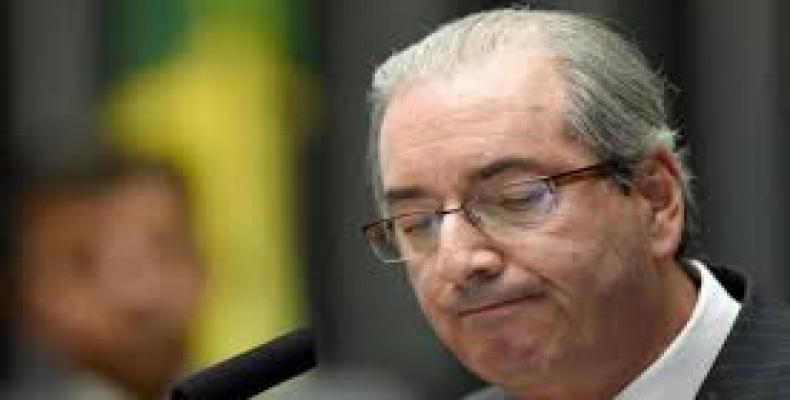Brasilia, October 19 (RHC)-- Federal authorities in Brazil have summoned Eduardo Cunha, the controversial former head of Congress and chief mastermind behind the impeachment bid against ousted President Dilma Rousseff, to face charges over accusations he hid laundered money in secret Swiss bank accounts while he was in office.
The subpoena was issued by federal Judge Sergio Moro, who has led the investigations into corruption in the state-run oil company Petrobras. Moro rejected a complaint over the charges from Attorney General Rodrigo Janot and filed the summons anyway. Cunha’s legal team now has 10 days to present his defense.
Cunha, a member of unelected President Michel Temer’s PMDB party, is accused of corruption, money laundering and tax evasion linked to raking in at least $5 million U$D in illicit kickbacks between 2006 and 2012 and hiding the wealth in Swiss bank accounts.
The controversial lawmaker was also implicated in the Panama Papers earlier this year. The leak revealed that Portugues business baron Idalecio de Castro Rodrigues de Oliveira, who wired at least $1.5 million to Cunha’s Swiss account in 2011 through a PMDB lobbyist as an intermediary, owned a conglomerate of 14 companies registered in the British Virgin Islands from 2003 and 2011.
According to the International Consortium for Investigative Journalists, 12 of Oliveira’s 14 offshore companies were incorporated “just months before” he entered in partnership with Petrobras, at the center of the massive Operation Car Wash scandal.
Cunha was removed from his position as speaker of the lower house on September 12th after being suspended in May -- just weeks after the lower house pushed through the impeachment bid against Rousseff -- to face an impeachment process over accusations that he intimidated lawmakers and hampered investigations. The Congress voted overwhelmingly in a 450 to 10 decision to remove the unpopular politician.
Along with his seat, Cunha was also stripped of the parliamentary immunity he long enjoyed, opening him up to corruption charges. He was also banned from holding public office for eight years, just like President Michel Temer.
Cunha, a self-proclaimed enemy of Dilma Rousseff and among the first lawmakers to break the alliance with her Workers’ Party despite the PMDB maintaining an official coalition, was a key architect in painting the impeachment process as a bid to root out government corruption.
While Cunha and Temer both face multi-million dollar bribery charges, Dilma Rousseff has never been accused of financial impropriety or personal enrichment. She was officially impeached on allegations of employing commonly-used accounting maneuvers to cover up a budget shortfall, though Temer recently admitted in a speech to business and political elites in New York that the real motivation behind her ouster was the fact that she refused to implement a radical neo-liberal economic agenda. The impeachment was widely condemned nationally and internationally as a parliamentary coup.
Despite the power he has wielded over Brazilian politics, recent polling has repeatedly unmasked Cunha as one of the most unpopular politicians in the country, including for those among his own party.
Brazil's Impeachment Mastermind Summoned for Corruption Charges


